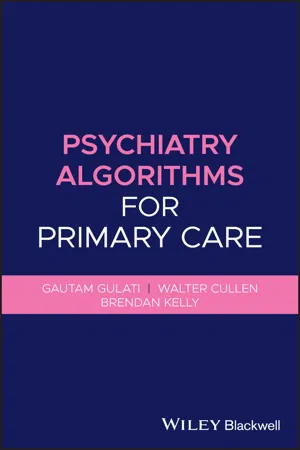
- English
- ePUB (mobile friendly)
- Available on iOS & Android
Psychiatry Algorithms for Primary Care
About this book
Psychiatry Algorithms for Primary Care is a practical, quick reference guide to psychiatric assessment and mental healthcare in general practice. Providing algorithms informed by evidence-based guidelines, this easy-to-use resource helps busy medical and healthcare professionals quickly assess mental health problems, make informed treatment decisions, and understand when referrals to specialist mental health services are appropriate. Drawing from their extensive experience in general practice and psychiatry, the authors provide clear and authoritative guidance on a wide range of common psychiatric disorders, complex scenarios, and special considerations.
Unique visual management algorithms define assessment, diagnosis, investigations and management for each condition, including Bipolar Affective Disorder, Psychosis, Depression, Dementia, and Attention Deficit Hyperactivity Disorder. Up-to-date information on medication choices and counselling strategies is found throughout the text. Designed for informing swift clinical decisions in demanding primary care settings, this indispensable reference guide:
- Conforms to the diagnostic criteria in the current edition of the World Health Organization's International Classification of Diseases
- Contains algorithms informed by the Royal College of General Practitioners (RCGP), Royal College of Psychiatrists (RCPsych), and the National Institute for Health and Care Excellence (NICE) guidelines
- Explores common complaints that can suggest psychological or psychiatric disorders, such as insomnia and fatigue
- Outlines special mental health considerations related to children, intellectual disability, autism, the elderly, and pregnancy
- Includes appendices covering commonly prescribed drugs and physical examinations for patients with severe mental illness
- Features numerous self-assessment questions and links to online reference tools for General Practitioners
Psychiatry Algorithms for Primary Care is a much-needed resource for medical students and trainees, physicians and healthcare professionals in general practice, nurse practitioners, and practitioners in other fields such as urgent care and emergency medicine.
Frequently asked questions
- Essential is ideal for learners and professionals who enjoy exploring a wide range of subjects. Access the Essential Library with 800,000+ trusted titles and best-sellers across business, personal growth, and the humanities. Includes unlimited reading time and Standard Read Aloud voice.
- Complete: Perfect for advanced learners and researchers needing full, unrestricted access. Unlock 1.4M+ books across hundreds of subjects, including academic and specialized titles. The Complete Plan also includes advanced features like Premium Read Aloud and Research Assistant.
Please note we cannot support devices running on iOS 13 and Android 7 or earlier. Learn more about using the app.
Information
PART 1
Introduction
CHAPTER 1
How to Use This Book
- provide a reminder of the essentials of psychiatric history‐taking and mental state examination;
- present a compendium of pragmatic, usable algorithms for decision‐making around psychiatric illness in general practice; and
- assist general practitioners and their teams in the delivery of high‐quality, evidence‐based, person‐centred mental health care.
Disclaimer
CHAPTER 2
History Taking in General Practice
General Points
- In ideal circumstances, a psychiatric history is taken in quiet, unhurried surroundings. In practice, this rarely occurs, but it is still important to optimise circumstances as far as possible, with as few interruptions as feasible.
- Active listening is important: paying genuine attention to someone for 10 minutes is better than speaking distracte...
Table of contents
- Cover
- Table of Contents
- Title Page
- Copyright Page
- Dedication Page
- Foreword
- Acknowledgements
- Author Profiles
- PART 1: Introduction
- PART 2: Common Psychiatric Disorders
- PART 3: Common Presentations in Primary Care
- PART 4: Complex Scenarios
- PART 5: Special Considerations In Prescribing
- PART 6: Appendices
- PART 7: Self-Assessment
- Index
- End User License Agreement